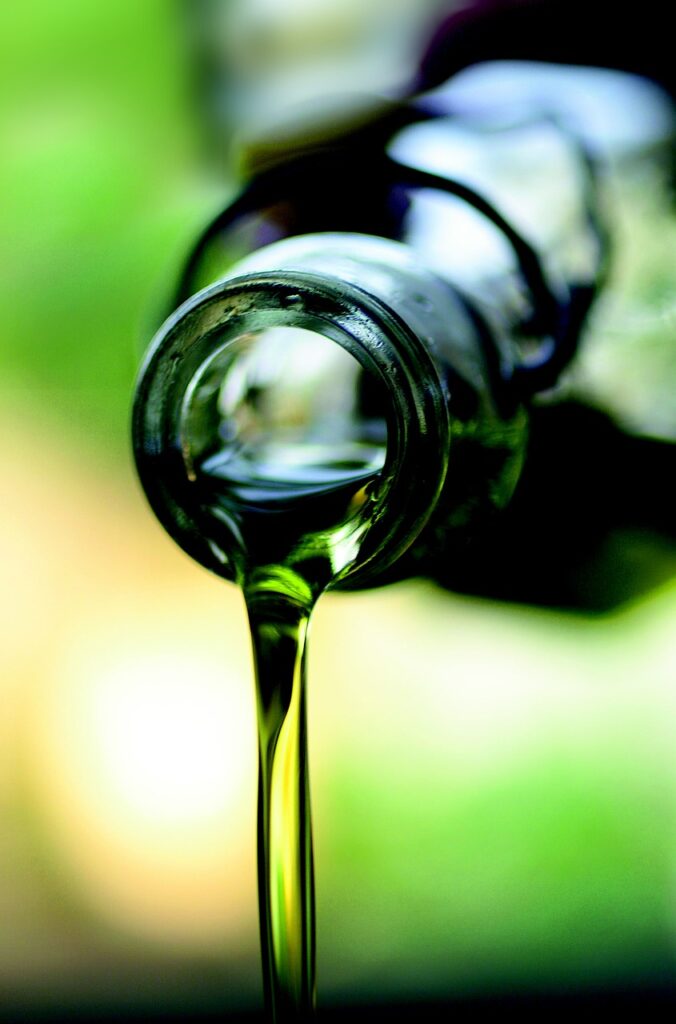
Olive oil is delicious. You can drizzle it on bread, cook with it, make marinades and dressings, add it to any recipe calling for oil or butter, cook eggs in it…we even found a recipe for an olive oil martini. You will find several types or grades in grocery and specialty stores, ranging from extra virgin olive oil (EVOO) to regular olive oil.
According to the American Heart Association, EVOO is the top choice for health benefits, but regular olive oil is a good second choice. EVOO is defined as the fatty fraction of olive juice extracted only by mechanical and physical processes without any refinement. It’s the lack of refinement that maintains both its sensory and health properties. “First-pressed” and “cold-pressed” are terms that emphasize the EVOO is an unrefined, natural product that has undergone a single, simple milling process without any processing to alter its quality.
Regular olive oil isn’t quite as good, but it’s still a better choice over less healthy fats like butter or vegetable cooking oil. Regular olive oil blends have been bleached, refined, deodorized and finally mixed with a little bit of EVOO – between 10 and 15 percent. That’s not to say that it’s bad, it’s just that EVOO retains more of its natural vitamins and antioxidants. So it’s more healthful than regular olive oil, but also a little more expensive.
Here are a dozen reasons to choose EVOO or regular olive oil for cooking and eating:
It’s good fat. Of all the edible plant oils, olive oil contains the highest percentage of monosaturated fat, AKA good fat. It’s good because it lowers bad-for-you LDL cholesterol and increases good-for-you HDL cholesterol.
Weight loss. After a randomized, double-blinded, placebo-controlled clinical trial, The National Institutes of Health reports that consumption of EVOO “improves body composition and blood pressure in women with excess body fat.” The monosaturated fatty acids (MUFAs) that olive oil is rich in are known metabolism increasers (you’ll burn more calories at rest), appetite reducers (they help you feel fuller longer) and can help you lose fat because the MUFAs decrease fat accumulation.
Better bone health and more strength. Scientists speculate that the antioxidant properties in olive oil, which are known to reduce inflammation, can help increase bone density by preventing bone breakdown and boosting bone growth. Inflammation in the body can indirectly damage bones by activating osteoclast cells, which break down bones.
Heart health. Do you know what the leading cause of premature death is, around the globe? Heart disease. EVOO contains multiple active compounds that contribute to heart health. In a large, 840,000-person study, it was found that the people who consumed the most olive oil were least likely to have heart issues, by nearly ten percent and also 11 percent less likely to die early compared with those who consumed the least olive oil.
Powerful antioxidants. The primary antioxidants in EVOO are flavones, lignans, secoiridoids and phenol alcohols and acids. These compounds have long been associated with positive impacts on cardiovascular diseases, diabetes, metabolic diseases, inflammation and many types of cancer.
Lower cancer risk. The National Institutes of Health tells us that the people who consume the most olive oil have a 31 percent lower likelihood of developing any type of cancer.
Polyphenols. EVOO is packed with them! Polyphenols are great for health because of their antioxidant properties. They fight against oxidative stress, a stress within the body that harms our DNA, lipids and proteins and leads to dementia, heart disease, diabetes and cancer. Two polyphenols present in large amounts in EVOO are oleocanthal and hydroxytyrosol, both of which have cancer-fighting, neuroprotective, antioxidant, anti-inflammatory and anti-microbial properties.
Lower risk of stroke. Olive oil is a stroke-risk-reducing superfood. The National Institutes of Health says “Olive oil is associated with lower risk of cardiovascular disease (CVD) and stroke. The maximum benefit could be obtained with a consumption between 20 and 30 g/day. The association could be stronger for virgin olive oil and might operate from the early stages of the disease.”
Multiple studies corroborate, including a French study of some 7,600+ senior citizens whose olive oil intake was classified three ways: those who ate none, those who ate moderate amounts (either in cooking or dressing) and those who ate “intensive” amounts (cooking and dressing). The organizers then corrected their sample audience for things like BMI, socio-demographics, dietary variables and physical activity and found that the people in the ‘intensive’ group had a 41 percent lower risk for stroke than the people who ate no olive oil.
Improved mood and mental health. While we would never suggest that mental illness is treatable with food, and we strongly encourage anyone struggling to call INTEGRIS Mental Health Clinic for medical care and help, there’s a growing body of research that suggest that the good fat in olive oil can help nerves function properly and increase levels of serotonin, one of our feel-good hormones. Another study suggests that consuming an olive oil-rich Mediterranean diet for 12 weeks reduced or mitigated moderate to severe depression in 30 percent of the participants.
Reduced inflammation and pain. If you’re dealing with arthritis or another inflammatory illness, olive oil is a good addition to your diet. Monosaturated (good) fats are known to reduce levels of a protein, C-reactive protein, which is elevated in patients with rheumatoid arthritis and other similar conditions. One of the polyphenols in EVOO, oleocanthal, has anti-inflammatory capabilities similar to ibuprofen.
Lower risk of type-2 diabetes. It’s all about monosaturated fatty acids (MUFAs) and polyphenols. MUFAs help promote balanced blood sugar levels and reduce inflammation. Polyphenols are bioactive compounds with potent anti-inflammatory and antioxidant properties. Together, they’re like Batman and Robin, only instead of criminals they fight disease and are helpful in managing – or even helping to prevent – type 2 diabetes, by working to stabilize blood sugar levels, buffering against dangerous spikes.
Cooking with olive oil makes other foods healthier. Food cooked in olive oil, specifically EVOO, absorbs olive oil’s antioxidants as it cooks because they are able to withstand high heat and do not break down. Cooking with olive oil also helps food retain its own nutrients. The Olive Wellness Institute cites a study in which broccoli was cooked two ways: in EVOO, and in sunflower oil. In the broccoli cooked in sunflower oil, the amount of vitamin C and other beneficial compounds was reduced; in the broccoli cooked in olive oil vitamin C levels were unchanged.
